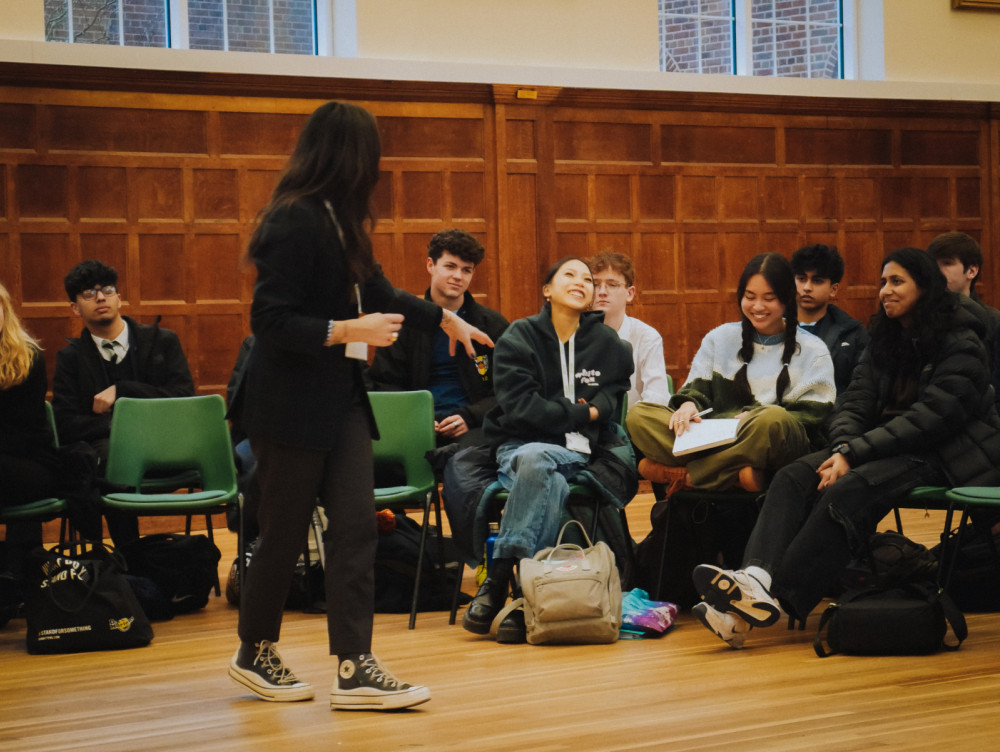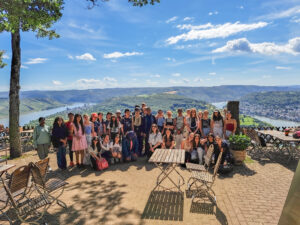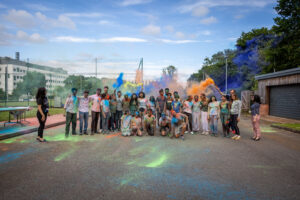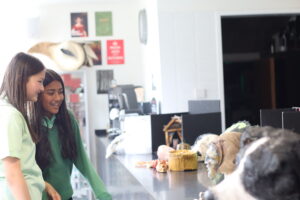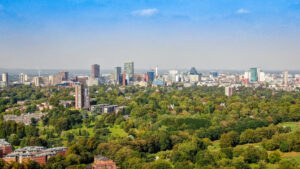On 8 March, we had the opportunity to attend a talk about psychology from Dr Josephine Chen-Wilson, a Senior Lecturer in Developmental and Educational Psychology. She opened her talk by telling us about her favourite female psychologists (which was topical as it was international women’s day), which was refreshing because the A-Level Psychology specification is very focused on male psychologists. Dr Chen-Wilson also told us about her motivation and how she became a lecturer in psychology. The future is quite intimidating, so having talks about careers in place is both engaging and thought-provoking. Myself, like many others in attendance on this talk, are interested in pursuing psychology in the future and having an external psychologist tell us about what day to day life is like in her job was an eye opening experience. Tilly (Lower Sixth)
On Wednesday 8 March, both KEHS and KES had the opportunity to attend a Design Thinking Workshop led by Ginevra Franchi of the Istituto Europeo di Design (IED). The workshop not only aimed to teach us of the principles of design thinking but also how they can be put into practice with an interactive activity that we participated in.
The session began with an overview of the history of IED led by Marta Malcontenti. I found this insightful to education pathways and opportunities abroad, ones which I wouldn’t have known about otherwise. It all started with Francesco Morelli who had a vision to create an innovative school focused on professions in the creative industry such as fashion design and visual arts. It was interesting to learn about how the school, from starting in Milan in the 70s, expanded to wider parts of Europe and eventually South America – Brazil. Now the IED carries on the legacy and vision of its original CEO and focuses on the development of culture and education in design and arts. Ginevra Franchi then taught us about the principles of design thinking. This included aspects of a business such as the understanding of design language which gives a brand visual identity and consistency, allowing it to be recognisable to consumers. She told us of how her job as a product designer meant that everyday she would be working on something different – from a backpack to furniture – keeping her job interesting and challenging her to think creatively all the time, which is something that I personally consider important for my own career in the future.
We were then able to put all that we had learnt into practice in an interactive activity of changing the well loved brand McDonalds to reach a different target audience. Dhaksha and I wanted to completely rebrand McDonalds and redirect it to include more adventurous flavours from different cultures. (Dhaksha was adamant about including her Kimchi Mayonnaise burger to the menu!) We really wanted to push the idea of ‘experimental flavours’ and thought that including the theme of a science lab-like environment would not only really make this come to life but also make the experience fun and interactive for customers as their sauces could come in a test tube like vessel. After redesigning the logo and creating an interior design for a potential McDonald’s restaurant, we presented our ideas to the rest of the group. It was fascinating to see the different ideas others came up with although given the exact same task. Overall, the workshop taught me distinct aspects of design and its applications in the real world through industries like fashion design, architecture, product design and business. I also got a sense of what it is like to study at the IED in Europe, but above all I thoroughly enjoyed being encouraged to think in a creative way and developing my design ideas. Abigail (Lower Sixth)
On Friday 10 March, we attended a talk from Dr Robert Brownlow on his career as a forensic scientist, allowing us an insight into a fascinating field of science. Dr Brownlow began with a rundown of the various jobs he has done in the field: from working as a Crime Scene Investigator for the Metropolitan Police, to working on a Counter terrorism taskforce, to becoming an advisor for the British Government, highlighting the wide range of opportunities there are within the field of forensic science. Having done a degree in zoology, forensic science was not necessarily the obvious next step. However, Dr Brownlow talked about the importance of choosing the most enjoyable career path, and how diverse entrance into Forensic Science can be. Graduates from zoology, chemistry, and many other courses can get into forensic science should they wish. Dr Brownlow then answered questions on each job, explaining how the atmosphere of each one differed greatly. A particularly surprising difference between typical crime show and actual CSI work is that working alone to photograph the crime is common as it avoids contamination. What they do get right, however, is the intense nature of the work. Dr Brownlow was incredibly open about how stomach turning some scenes can be, providing valuable insight into the gritty realities of the job. Dr Brownlow was incredibly open when answering our multitude of questions and has provided information that will surely be extremely useful in the future. Many thanks to him for entertaining our curiosity and creating such an interesting talk. Rowan (Upper Fifth)
Also on 10 March, the Upper Fourth were involved in a lively speed networking session with a variety of visiting professionals. From psychologists to journalists, there was something for everyone as we interviewed professionals on their jobs and careers. We worked together in groups to write questions that were to enlighten us on careers that we are interested in pursuing and jobs that we did not know much about. Thank you to Mrs Quigley for organising this event and to all the visiting professionals who generously shared their expertise on the exciting world of careers! Poppy (Upper Fourth)


